
Original content written by Quinten Laurentino, College of Engineering News
Paige Seibert may come from a small town, but her ambitions will help create a sustainable future for millions of people across the United States.
This summer, Seibert is interning at the National Renewable Energy Laboratory (NREL) in Golden, Colorado. It was an opportunity that she knew would teach her how to help save our planet, Seibert’s lifelong dream.
Seibert came to North Carolina State University from Clear Spring, Maryland, with the goal of learning how she could help to ensure the sustainability of our environment.
Upon arrival at NC State, however, Seibert quickly learned that biological and agricultural engineering was the right path for her.
“I originally came to NC State as an environmental science major, and I realized that we were learning more about the problems and less about how to fix them. I wanted to be more on the side of making new solutions,” she says.
Seibert, a Park Scholar in the Class of 2024 and rising senior who wants to become either an engineer or a professor, knew Raleigh was the place for her when she first set foot on campus.
“Honestly, what made me pick NC State is I came for a finalist weekend for Park Scholarships, and as soon as I left that weekend, I was like, ‘I have to go here no matter what.’”
Seibert used the experience and knowledge she gained in the classroom to earn a spot in the Research Experience for Undergraduates program at Auburn University, where she learned about bioprocessing waste into products of value. While there, Seibert’s advisers recommended that she apply for an internship opportunity at the NREL.
Seibert’s main project at the lab this summer involves assisting with a chemical reaction that uses carbon dioxide to create formic acid, which can eventually be turned into biofuel.
“My job is basically growing the cells and optimizing the process up until it gets to a bioreactor because they’re having trouble getting enough of the cells to live to that point in high concentrations,” Seibert says.
An average day at the lab for Seibert involves a lot of testing and sample taking, leading up to an analysis of the results at the end of each week.
Not only has Seibert learned the physical process of turning formic acid into biofuel, but her internship opportunity has also taught her about industrial concerns and cost efficiency.
Through the busy days of testing and analyzing, Seibert’s favorite part about her summer internship has been learning from her co-workers.
“It’s been really nice to be surrounded by people who are so smart and care about the environment,” Seibert says.
She also noted how helpful her co-workers have been in her transition to the fast-paced, highly efficient environment of a national laboratory.